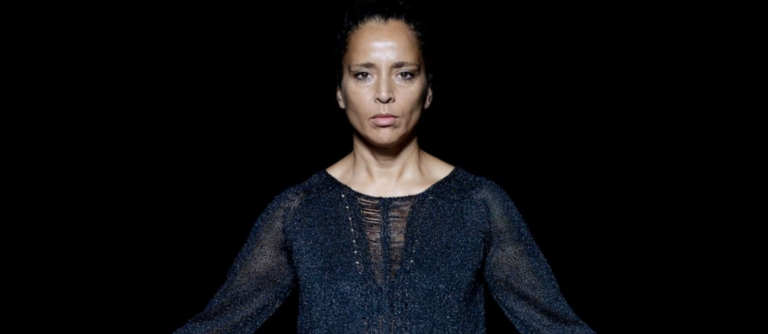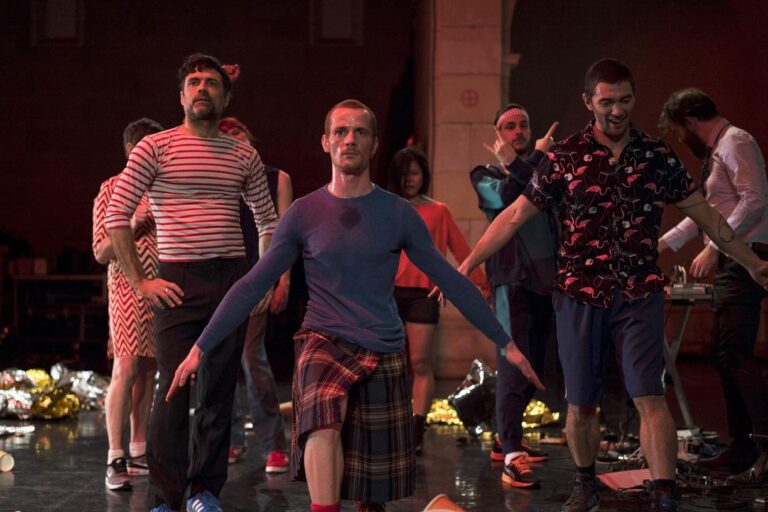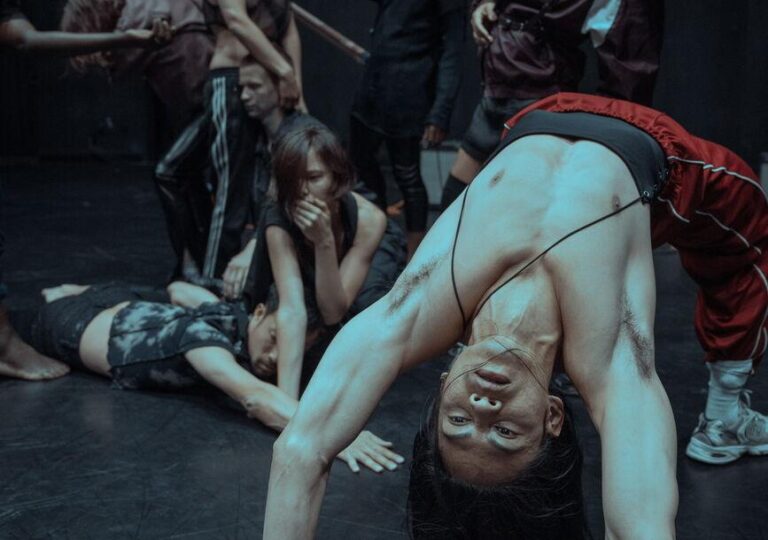
Halory Goerger
Stage Director
May-June 2023
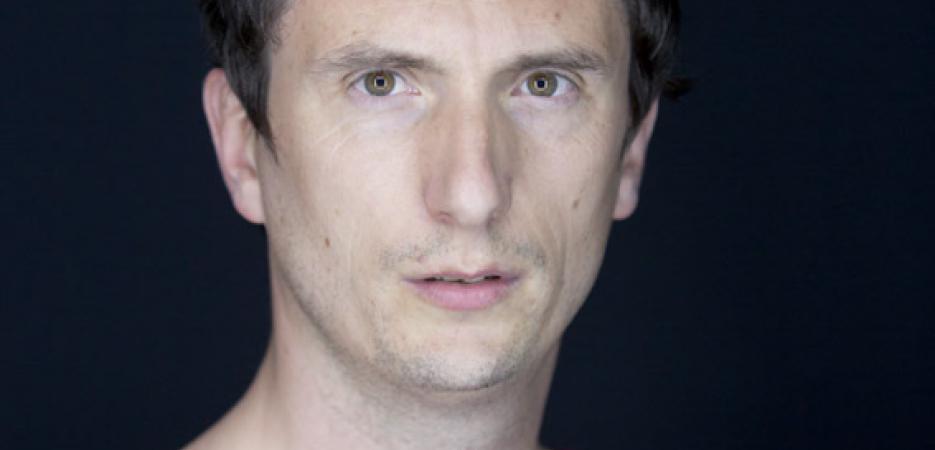
Giovanni Cittadini Cesi
- Performing Arts
- Chicago
“I want to pay tribute to “hard” music (techno, electro, etc.), which is inexorably linked to Chicago and Detroit, and part of a complex biotope of producers, musicians, managers, end-users, and more.”
I think it’s in everyone’s best interest that I create shows and installations rather than do something like building houses or treating sick animals. I work on the history of ideas because all the other jobs were already taken. As I write, direct, and act in plays of varying forms, I am guided by one desire only: to expand and reshape the artistic terrain. My plays are written as a sort of organized chaos that places everything on equal footing, from text to acting, light, sound, set, and equipment.
After a few performances and videos, including Bonjour concert (“Hello, Concert”) in 2007, I wrote two plays, entitled &&&&& & &&& (2008) and Germinal (2012), the latter of which I produced alongside Antoine Defoort. In 2015, I wrote a farce about depressed astronauts called Corps diplomatique (“Diplomatic Body”), followed, in 2016, by Il est trop tôt pour un titre (“It’s Too Early for a Title”), a show about the origins of the circus called.
In 2019, I developed a play about Morton Feldman entitled Four For and, in 2021, I worked on the libretto and staging for the opera Au cœur de l’océan (“At the Ocean’s Heart”), composed by Frédéric Blondy, Arthur Lavandier and le Balcon). With Jack (2024), I intend to continue this work on the music of creation, as a tribute to “hard” music (techno, electro, etc.).
Born in 1978, author, stage director, actor, and screenwriter Halory Goerger lives in Lille, France, located north of pretty much everywhere else. After a brief foray into poetry, he became a performer, then, by mistake, began writing theater. First a solo, then a duet, trio, quartet, quintet–you get the idea. In 2008, he co-founded the company Amicale de production, where he worked as artistic co-director for several years. He left in 2016 to pursue his own projects within his company, Bravo Zoulou. Although he doesn’t have too many penalty points on his artist’s permit yet, Halory prays every day that it won’t be revoked. He doesn’t know how to do anything else.
I’m working on a musical theater project called Jack, a tribute to a particular approach to sound that can be described as “hard” music. Techno, house, electro, functional music intended for dance but also listened to beyond the club for its own intrinsic qualities, this music–part of a complex biotope of producers, musicians, managers, end-users, and more–was born of a potent cultural mishmash occurring especially between Europe and the USA, particularly in Chicago and Detroit.
For my research project, I want to feed my writing of the play’s dialog by gathering accounts from these individuals, each informed by their own socio-economic landscape. I am seeking to identify the various aspects that affect them, as linked to aural phenomena (such as composition, structure, acoustics, etc.).
In an abandoned club, the cast of Jack are gathered at what looks a bit like an AA meeting. They comment on different emotions linked to listening contexts, expressing either their enjoyment or their dread, weighing them up, analyzing them. Music can impact our bodies, heal us, console us, or saturate our brains to the point of oblivion. The play’s characters postulate that one of the finest ways to take part in society lies in our capacity to give in: to others, to ourselves, to the cosmos. We ascend, we plateau, we descend. And, perhaps, if all goes well, we can find joy again, for good this time.
Chicago and Detroit: two cities that truly embody music, so much so that subgenres have been named after them. A certain track might be more “Chicago” than “Detroit,” for instance. How can a city color a sound to such an extent? The best way to answer this would probably be to go there to study the question. To do so, I intend to meet with musicians, as contextualized within their production, to identify the mechanisms at play in their work, label managers and producers, to understand their overall working logic, sound engineers, to address the more precise questions of their meticulous aural art, clubbers, whose memories I will collect, any and all other individuals involved in the long chain that links a musical idea right through to its end-use and Alcoholics- and Narcotics Anonymous, whose treatment programs—firmly anchored in North American culture—bear similarities to the “apparatus” of my play.
I will also immerse myself in the past and present spaces of this culture, attempting to grasp how these two cities have crafted such identifiable sounds. The results of this research will then be woven into my wider reflection on our sometimes-irrational relationships with music, expanding into other scenes and genres.
In partnership with
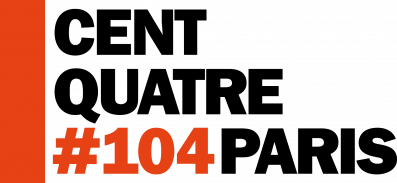
CENTQUATRE-PARIS
Located in Paris’ 19th arrondissement, the CENTQUATRE-PARIS is a multipurpose art space which hosts and showcases artist residencies and artistic productions for audiences and artists from around the world. Conceived as a collaborative platform by its director José-Manuel Gonçalvès and his teams, the venue provides access to all of today’s arts from all disciplines, through a resolutely popular, contemporary and cutting edge programme. An atypical venue with shops and restaurants, it also boasts free access spaces for artistic practices and activities for young children.
Halory Goerger

La Pop
Opened to the public in March 2016, La Pop is an artistic and civic incubator, a place for residencies, research and experimentation. It is a production structure and a place for multidisciplinary creations that questions the roles and functions that music and sounds play for the individual, communities, society or ecosystems.
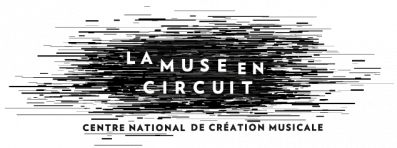
La Muse en Circuit
La Muse en Circuit, National Center for Musical Creation, is dedicated in all its activities to music that decompartmentalizes the field of sound art, new and even innovative music, emancipated and audacious, whether instrumental, electronic or mixed, whether deepen the paths of sound alone or also explore other artistic territories, such as literature, theatre, dance, video or the visual arts. La Muse en Circuit is also concerned with research, ensuring the digital technology watch essential to the development of the music of tomorrow.



